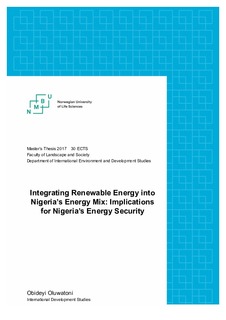Integrating renewable energy into Nigeria's energy mix : implications for Nigeria's energy security
Master thesis
Submitted version
Permanent lenke
http://hdl.handle.net/11250/2459590Utgivelsesdato
2017Metadata
Vis full innførselSamlinger
Sammendrag
With increased awareness in the importance of energy to economic and social development, the need to attain energy security has increasingly become a paramount factor in the energy agenda of countries. To expand their energy options and reduce dependence on fossil fuel resource countries are exploiting and including renewable energy into their energy mix. This is especially pertinent for countries that are heavily dependent on fossil fuels and have poor energy access like Nigeria. Despite its huge resources, its energy sector is grossly underdeveloped, thereby creating an energy security gap. As such, this study examines the share of renewable energy in its current mix and analyses the possible effect of renewables on Nigeria’s energy security if fully exploited.
The study uses qualitative methods to assess the state of energy security, the renewable energy potential and integration level as well as its effect the energy security of the Nigeria. An energy security assessment framework was developed to tailor the peculiarities of the Nigerian energy system and this serves as a guide for this study. Existing literature focus on analyzing the state of energy security in Nigeria with focus on how all source of energy can by utilized, however, this study gives an updated status of energy security, renewable energy integration in Nigeria and most importantly projects the possible impacts renewable energy integration can have on its energy security.
The study reveals that the Nigerian government is conscious of the challenge of energy security faced by the nation and there are attempts made by the government and private individuals and institution to increase the share of renewable energy in the energy mix. This is met by several challenges identified by this study, hence renewable energy integration has been too slow. The study argues that the government lacks implementation of renewable energy policies and need to include more renewable energy incentives. It also suggests the need to increase renewable energy incentives and ensure rapid completion of renewable energy projects in the nation.
Utgiver
Norwegian University of Life Sciences, ÅsBeslektede innførsler
Viser innførsler beslektet ved tittel, forfatter og emneord.
-
Fornybar energi vs. fossil energi : en empirisk analyse av aksjefond og indekser innenfor fornybar energi og fossil energi, og hvordan disse investeringene blir påvirket av oljepris
Farnes, Vibeke Andrea Haram (Master thesis, 2015-10-08)Formålet med denne oppgaven er å se om det finnes noen forskjell i risikojustert ytelse for investeringer i selskaper som driver sin virksomhet innenfor fornybar energi og fossil energi i perioden januar 2009 til desember ... -
Guarantees of origin for electricity - an analysis of its potential to increase new renewable energy in the North European energy system
Martinsen, Thomas; Mouilleron, Marine (MINA fagrapport;67, Report, 2020)The guarantee of origin scheme (GO) has been criticized for its insignificant impact on the development of new renewable energy and the contribution to reducing CO2 emissions. The reason is that sales of GO from old ... -
Open windows and closed doors : a case study of energy efficiency improving technologies given low energy prices and institutional barriers in the Ukrainian heating market
Evensen, Simen Gurholt; Fedoryshyn, Nadiya (Master thesis, 2012-06-22)The level of energy efficiency in Ukraine has been very low compared to the European countries ever since the country gained independence in 1991. Energy efficiency improvement and reduction of gas dependence has been a ...

